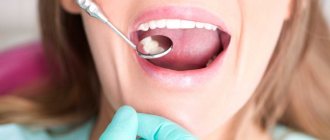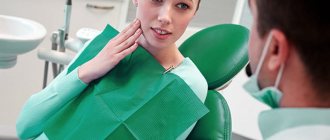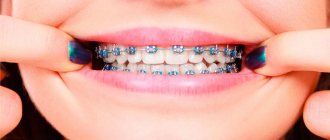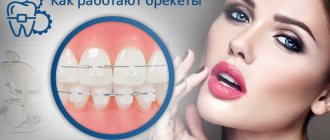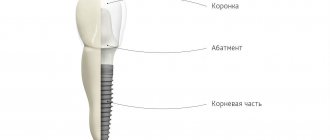Since childhood, our parents have taught us that eating a lot of sweets is bad for our teeth. Now, having become parents, we not only repeat the same thing to our children, but we also know from our own experience how unpleasant it is when teeth react to sweets. The pain can be sharp or barely noticeable, and usually, if you rinse your mouth, it goes away immediately. But is increased enamel sensitivity really safe, and are we taking this symptom too lightly? Let's find out!
- The effect of sweets on teeth
- Why do teeth react to sweets?
- Tooth reacts to sweets after filling
- What to do if your teeth begin to react to sweets?
- What complications may arise?
- How to eat sweets without harming your teeth?
Sweets
The main “enemies” of teeth are chewing candies and caramel. Pieces of toffee or other chewing candies can get stuck in the spaces between teeth, contacting the enamel for a long time, causing accelerated growth of bacteria. Caramel changes the composition of saliva if it is absorbed; it can cause tooth decay, chips, cracks if it is chewed.
Dried fruits are considered harmful sweets. They contain a lot of sugar, stick to teeth, and get stuck in the spaces between teeth.
The exception is dark chocolate, which is considered beneficial for teeth due to the content of polyphenols and flavonoids. They have antibacterial properties and slow down plaque formation.
What can you do at home?
What to do at home when your teeth react to sweets and hurt from chocolate?
- If you experience severe discomfort, you can take a tablet of any painkiller before going to the doctor.
- Use special gels and pastes, rinses that reduce hypersensitivity.
- Traditional methods are usually ineffective, but can temporarily relieve discomfort. These include rinsing the mouth with a decoction of oak bark, sage, and applying tea tree oil to problem areas.
It should be remembered that self-medication is not recommended. This may be a necessary measure while waiting for an appointment with a doctor. It is advisable to carry out all independent manipulations after consultation with a specialist.
Caffeine
Drinks containing caffeine (any type of coffee, cola, energy drinks) provoke dehydration and slow down the absorption of vitamins and minerals (including calcium). They stain teeth, change the color of enamel, making it darker. Therefore, dentists at the Dentospas clinic do not recommend drinking coffee in large quantities.
Caffeine also has beneficial properties: it contains fluoride and has an antibacterial effect, but coffee drinks do more harm to teeth than good. You can replace coffee with chicory. For those who are used to drinking a lot of green tea, it is better to switch to herbal teas.
You have questions?
We will call you back within 30 seconds
+7
Treatment of hyperesthesia
When your teeth hurt after eating sweets, what should you do? The main thing is not to delay going to a specialist. You should not self-medicate, as this can aggravate the situation and lead to the development of complications.
The maximum that can be done before visiting a doctor to reduce pain is to take an anesthetic tablet and rinse your mouth with a rinse marked “for sensitive enamel”, a soda solution or sage decoction.
General treatment strategy
Only a doctor can determine which direction you should follow.
If you are asking the question: “Why do my teeth hurt when I eat sweets?”, then there are several approaches to restore the integrity of the enamel in the presence of microcracks.
- Remineralization.
- Physiotherapy.
- Application of fluoride varnish.
All of these methods are applicable when there is no significant defect. If there is caries, then it is subject to high-quality treatment. If there are problems with the gums, an appropriate therapeutic strategy is selected.
Remineralization
If the surface layer of enamel is partially destroyed, it is recommended to use special gels that contain a complex of minerals (fluorine and calcium).
If your teeth and gums hurt from sweets, but there is no caries, this is the best option to eliminate the problem. With regular application of remineralizing agents to damaged elements, microcracks are eliminated and sensitivity to external irritants is reduced.
Fluoridation
The procedure is carried out in two ways:
- Simple. It can be carried out when the enamel is slightly damaged. The bottom line is that a remineralizing mass is applied to the damaged parts and protective caps are put on top. The mixture is kept for 15 minutes, after which the oral cavity is treated. For more effective treatment, you need to undergo several such procedures.
- Complex fluoridation begins with professional cleaning, after which a special composition is applied intermittently.
Medicines and alcohol
Some medications and all alcoholic drinks disrupt the water balance and cause dry mouth. The secretion of saliva decreases, it stops constantly washing the teeth, cleaning them and saturating the enamel with minerals. Dry mouth makes the gums vulnerable to injury and inflammation, which can lead to periodontal disease. Sweet alcoholic drinks are especially harmful: liqueurs, wines. Adding to the dryness when consuming them is the effect of sugar and acids. Red wine additionally stains the enamel.
Selection of paste for prevention
For hyperesthesia, it is important to choose the appropriate care designed for sensitive enamel. Such products are distinguished not only by more delicate cleansing, but also contain components that promote remineralization and reduce gum inflammation.
What parameters to pay attention to when choosing.
- When your teeth become clogged with sweets, choose products to cleanse your mouth that contain ingredients designed to reduce sensitivity - fluoride, strontium, zinc salts, hydroxyapatite, potassium chloride or nitrate, calcium carbonate and arginine.
- The product should have an abrasiveness no higher than 25-35 RDA (for example, for bleaching options this figure can reach 100-120).
Roasted seeds and nuts
Fresh nuts and seeds can even be healthy, but when heated, most of the valuable substances are destroyed. Instead of vitamins, fatty acids, amino acids, harmful substances are formed. Particles of seeds and nuts can get stuck in the spaces between teeth, under the edge of the gums. If a person often gnaws on seeds, he injures and wears out the enamel on his teeth. Crunching hard nuts cannot be called useful either. If you cannot do without such snacks, it is better to cook them yourself, frying them so that they remain raw inside.
The effect of sugar on enamel
The product itself is not an aggressor and does not destroy surfaces. But when entering the oral cavity along with food, light carbohydrates create favorable conditions for the rapid growth of pathogenic microflora.
Bacteria, feeding on fructose and glucose, actively release waste products, including many aggressive acids. It is they that lead first to a decrease in the thickness of the protective layer, then to the destruction of the enamel and increased tooth sensitivity to sweets.
Any hot and cold foods
They are dangerous due to sudden changes in temperature, which can cause the enamel to crack. Harmful microorganisms accumulate in microcracks. Cracks expand over time, leading to chipping or tooth decay. Hot drinks and foods are additionally dangerous for the mucous membranes. Her regular burns can provoke the appearance of stomatitis. The combination of hot and cold is considered the most dangerous (for example, if a hot meal is washed down with a chilled drink).
Sensitivity Prevention
To prevent the occurrence of hyperesthesia, it is important to pay due attention to regular hygiene procedures. After finishing meals, rinse your mouth thoroughly.
If your tooth hurts after eating something sweet, you need to undergo systematic preventive examinations at the dentist. If necessary, have it professionally cleaned - this will help avoid the formation of plaque and get rid of the stone.
Clean your teeth with the right toothpaste, containing the entire set of microelements. Choose brushes of medium hardness that do not injure your gums. Carefully remove food debris from between teeth using floss. Use a waterpik regularly.
Citrus
Any citrus fruit contains citric acid, which causes calcium to be washed out of the teeth. Because of it, the enamel can become more sensitive. With frequent consumption of sour citrus fruits, areas of irritation and inflammation may appear on the mucous membranes and gums.
To protect your teeth from harmful products, DentoSpas recommends:
- brush your teeth twice a day (in the morning and at night - before bed, after dinner);
- floss after every meal or snack;
- After drinking any harmful drinks, use a mouthwash that does not contain alcohol;
- eat more solid foods, greens, hard vegetables, fruits: chewing them helps clean the surface of the enamel and interdental spaces;
- It is better to drink sweet carbonated and alcoholic drinks through a straw, which will reduce the harmful effects on the enamel.
Diagnosis of hyperesthesia
If your teeth hurt from sweets, what should you do? It is imperative to conduct a high-quality examination, including in order to exclude serious diseases: pulpitis and periodontitis. This can only be done by a professional - therefore, you should not self-medicate, and if pathological symptoms occur, consult a doctor as soon as possible.
Dentists adhere to a certain algorithm.
- A visual inspection is carried out, during which significant enamel defects and chips may be detected.
- EDI (electroodontodiagnosis) is a research method that monitors the reaction to a directed electric current. Pathology should be suspected if the final value exceeds 2-6 microamps. But this technique only works on living pulp, and is considered not always reliable and already outdated.
- The cold test is a more common test used by dentists. During the study, the surface is exposed to cold or heat, in which the nerve endings react to the stimulus. The dentist evaluates the speed and severity of the reaction. The Freeze test is the most accessible, fastest, convenient and reliable method for determining the disease.
Let's sum it up
Only a qualified doctor will be able to determine the tactics and scope of therapy, so you should not self-medicate. Timely medical intervention will help resolve problems and prevent the development of complications.
If your teeth hurt from sweets or react to heat or cold, then it is important to identify and eliminate the cause as quickly as possible. This may be a banal thinning of the enamel or lesions that require serious therapy. Visit the website dentika.ru and find out everything about modern dental care first-hand.
Experts' opinion
The clinical effectiveness of Asepta products has been repeatedly proven by scientific research. For example, as part of a clinical study of the line of products conducted by Doctor of Medical Sciences, Professor A.I. Grudyanov, the high effectiveness of the Asepta mouth rinse for moderate periodontitis was established.
Research conducted at the Kazan State Academy also determined that the use of preparations from the Asepta line (gels, balms, toothpastes, rinses) makes the treatment of chronic catarrhal gingivitis and other inflammations, mild and moderate chronic periodontitis, hyperesthesia of hard dental tissues more effective , which together significantly reduces the duration of treatment and increases the duration of remission in this category of patients.
Sources:
- Study of the clinical effectiveness of treatment and prophylactic agents of the Asepta line in the treatment of inflammatory periodontal diseases (A.I. Grudyanov, I.Yu. Aleksandrovskaya, V.Yu. Korzunina) A.I. GRUDYANOV, Doctor of Medical Sciences, Prof., Head of Department I.Yu. ALEXANDROVSKAYA, Ph.D. V.Yu. KORZUNINA, asp. Department of Periodontology, Central Research Institute of Dentistry and Maxillofacial Surgery, Rosmedtekhnologii, Moscow
- The use of drugs from the Asepta line in the complex treatment of inflammatory periodontal diseases (N.V. Berezina E.N. Silantyeva S.M. Krivonos, Kazan State Medical Academy. Kazan.) N.V. BEREZINA, E.N. SILANTIEVA, S.M. KRIVONOS Kazan State Medical Academy
- Report on the determination/confirmation of the preventive properties of personal oral hygiene products “ASEPTA PLUS” Remineralization doctor-researcher A.A. Leontyev, head Department of Preventive Dentistry, Doctor of Medical Sciences, Professor S.B. Ulitovsky First St. Petersburg State Medical University named after. acad. I.P. Pavlova, Department of Preventive Dentistry
- Clinical studies of antisensitive toothpaste “Asepta Sensitive” (A.A. Leontyev, O.V. Kalinina, S.B. Ulitovsky) A.A. LEONTIEV, dentist O.V. KALININA, dentist S.B. ULITOVSKY, Doctor of Medical Sciences, Prof. Department of Therapeutic Dentistry, St. Petersburg State Medical University named after. acad. I.P. Pavlova
- https://www.youtube.com/watch?v=pkFytNfE0NM
- https://www.youtube.com/watch?v=xRPTq5y9YRQ



